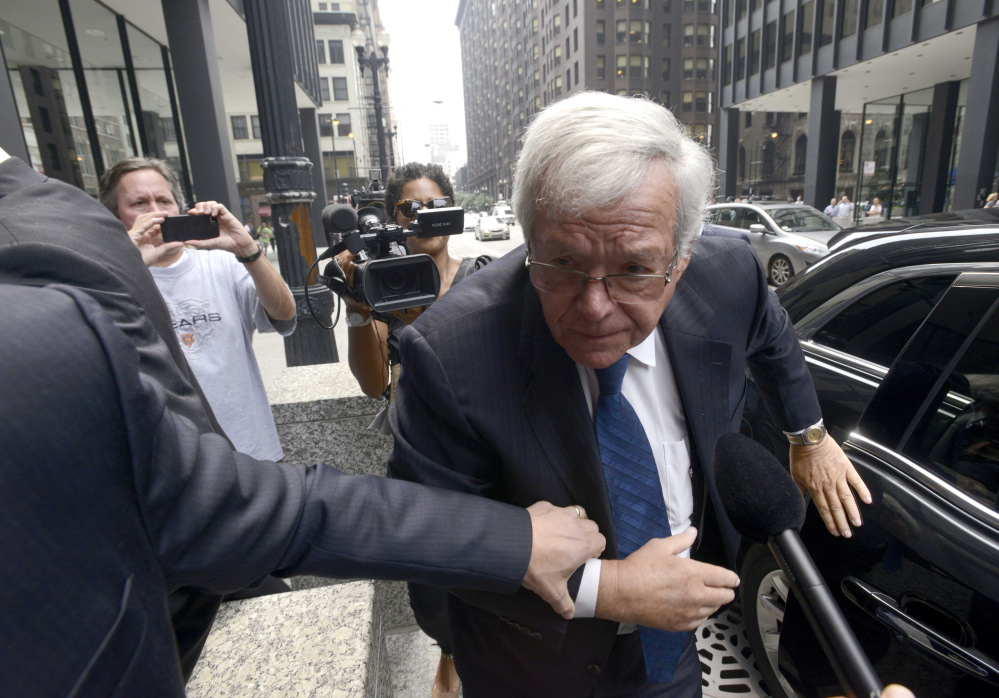CHICAGO – Dennis Hastert appeared in court Tuesday for the first time since he was indicted, pleading not guilty to charges that he violated banking rules and lied to the FBI in a scheme to pay $3.5 million in hush money to conceal misconduct from his days as a high school teacher.
Defense attorney Thomas C. Green entered the pleas on behalf of the former House speaker, who looked visibly ill-at-ease during the 20-minute hearing. He stood motionless before the judge’s bench, his shoulders hunched, his hands folded and his eyes cast downward to the floor.
When the judge asked on several occasions if he understood the proceedings, Hastert nodded his head and answered quietly, “Yes, sir.”
The 73-year-old Republican has not spoken publicly about the accusations that emerged two weeks ago and which quickly raised questions about possible sexual abuse by the man who was once second in the line of succession to the presidency.
The politician-turned-lobbyist stepped before Judge Thomas M. Durkin on charges that he broke federal banking laws by withdrawing hundreds of thousands of dollars in cash and lying about the money when questioned.
The judge set conditions for Hastert’s release, instructing him to cooperate in the collection of DNA if authorized by the court and to advise officials before changing his name or phone number – all standard requirements.
Hastert was ordered to remain in the continental U.S. Just before the hearing began, he reached into a pocket, pulled out his passport and handed it to his attorney, who surrendered it to a court official.
The former congressman was also ordered to have any firearms removed from his property by June 23 and was forbidden from having contact with victims or witnesses in the case.
The judge gave attorneys until Thursday to say if they want him to stay on the case.
Prosecutors have not said if they will ask Durkin to recuse himself. Federal Election Commission records show he donated $500 to the “Hastert for Congress” campaign in 2002 and $1,000 in 2004. Durkin was an attorney at a Chicago law firm at the time of the contributions.
The judge said he had no doubt he could be impartial.
Green, who is based in Washington, has represented clients in the Watergate, Iran-Contra and Whitewater cases. Chicago attorney John Gallo is also on Hastert’s defense team. Steven Block is the lead U.S. prosecutor.
Prosecutors did not shed any more light on the secret Hastert allegedly sought to conceal by paying the person the indictment refers to as “Individual A.”
A person familiar with the allegations told The Associated Press the payments were intended to conceal claims Hastert sexually molested someone decades ago. The person spoke to the AP on the condition of anonymity because the investigation is ongoing.
Authorities never arrested Hastert, but the judge told him he would forfeit $4,500 if he did not show up for his next hearing.
If convicted, Hastert faces a maximum five-year prison term on each of the two counts.
The indictment says Hastert agreed in 2010 to pay Individual A $3.5 million to “compensate for and conceal (Hastert’s) prior misconduct” against that person. It says he paid $1.7 million before federal agents began scrutinizing the transactions.
He allegedly started by withdrawing $50,000 at a time and changed course when automatic bank transaction reports flagged those withdrawals. The indictment says Hastert then began taking cash out in increments of less than $10,000 to skirt reporting rules, which are primarily meant to thwart money laundering by underworld figures.
It’s not illegal to withdraw large amounts in cash. But it’s against the law to stagger withdraws with the intent of dodging reporting requirements.
Hastert follows a well-trodden path of other Illinois politicians who have walked through the revolving doors at Chicago’s federal courthouse. Several recent Illinois governors, Chicago aldermen and other public figures have entered pleas in the same building. Among the most recent was former Illinois Gov. Rod Blagojevich, a Democrat, and former Illinois Gov. George Ryan, a Republican. Both men were eventually convicted on corruption charges.
Associated Press Writer Eric Tucker in Washington, D.C., contributed to this report.
Send questions/comments to the editors.



Success. Please wait for the page to reload. If the page does not reload within 5 seconds, please refresh the page.
Enter your email and password to access comments.
Hi, to comment on stories you must . This profile is in addition to your subscription and website login.
Already have a commenting profile? .
Invalid username/password.
Please check your email to confirm and complete your registration.
Only subscribers are eligible to post comments. Please subscribe or login first for digital access. Here’s why.
Use the form below to reset your password. When you've submitted your account email, we will send an email with a reset code.